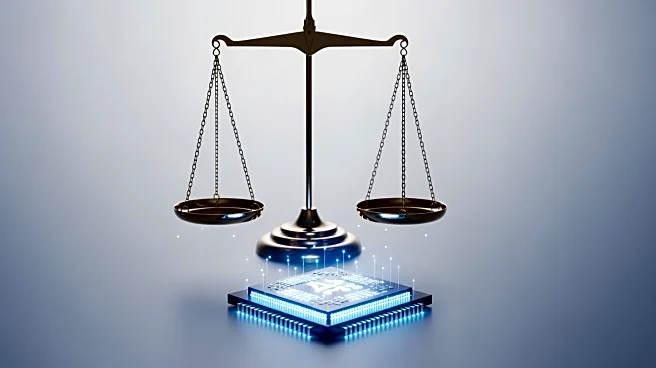What's Happening?
Stability AI, an artificial intelligence company, has largely prevailed in a legal battle against Getty Images in the United Kingdom. The case, which was heard at Britain's High Court, revolved around
allegations of intellectual property infringement. Getty Images, known for its extensive library of images and videos, accused Stability AI of infringing its trademark and copyright through the development of its AI image generator, Stable Diffusion. While Getty succeeded partially in its trademark claims, the court dismissed its secondary copyright infringement allegations. Stability AI argued that the training of its AI model occurred outside the UK, on computers operated by Amazon, and that only a small fraction of the AI-generated images resembled Getty's works. The ruling is seen as a significant moment in the ongoing legal debates surrounding AI and intellectual property.
Why It's Important?
The court's decision is pivotal in the broader context of intellectual property rights in the age of artificial intelligence. It highlights the challenges faced by creative industries in protecting their works against AI technologies that utilize vast amounts of data for training purposes. The ruling may influence future cases involving AI and copyright, as tech companies often rely on 'fair use' doctrines to justify their practices. The outcome is particularly relevant for U.S. stakeholders, as Getty is pursuing similar legal action against Stability AI in the United States. The case underscores the tension between technological innovation and the rights of content creators, potentially impacting how AI companies develop and deploy their technologies.
What's Next?
Getty Images is continuing its legal battle against Stability AI in the United States, with a lawsuit filed in a San Francisco federal court. The outcome of this case could further define the legal boundaries for AI-generated content and its use of copyrighted materials. As the generative AI industry grows, more legal challenges are expected, with creative industries seeking to protect their intellectual property. The decision may prompt tech companies to reassess their AI training methods and consider the implications of using copyrighted content. Stakeholders in the tech and creative sectors will be closely monitoring these developments, as they could lead to new regulations or industry standards.
Beyond the Headlines
The case raises ethical questions about the balance between innovation and intellectual property rights. It challenges the notion of 'fair use' in the digital age, where AI technologies can replicate and transform existing works. The ruling may encourage discussions on how to fairly compensate creators whose works are used in AI training. Additionally, it highlights the need for clear legal frameworks to address the complexities of AI and copyright, ensuring that both technological advancement and creative rights are protected.









